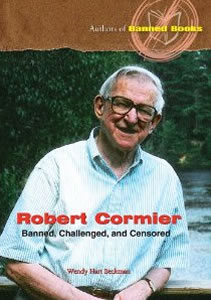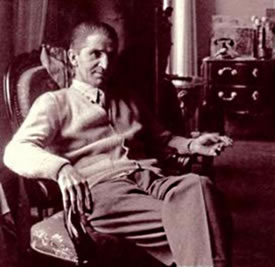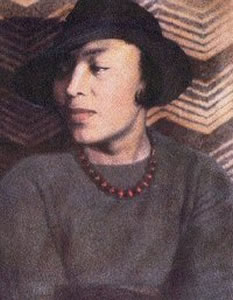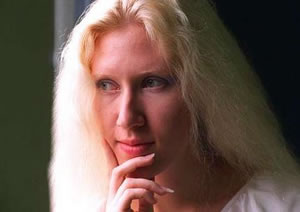De Amerikaanse schrijver Robert Cormier werd geboren in Leominster, Massachusetts, op 7 januari 1925. Zie ook mijn blog van 7 januari 2009 en ook mijn blog van 7 januari 2010.
Uit: I Am the Cheese
„I am riding the bicycle and I am on Route 31 in Monument, Massachusetts, on my way to Rutterburg, Vermont, and I’m pedaling furiously because this is an old-fashioned bike, no speeds, no fenders, only the warped tires and the brakes that don’t always work and the handlebars with cracked rubber grips to steer with. A plain bike – the kind my father rode as a kid years ago. It’s cold as I pedal along, the wind like a snake slithering up my sleeves and into my jacket and my pants legs, too. But I keep pedaling, I keep pedaling.
This is Mechanic Street in Monument, and to my right, high above on a hill, there’s a hospital and I glance up at the place and I think of my father in Rutterburg, Vermont, and my pedaling accelerates. It’s ten o’clock in the morning and it is October, not a Thomas Wolfe October of burning leaves and ghost winds but a rotten October, dreary, cold, damp with little sun and no warmth at all. Nobody reads Thomas Wolfe anymore, I guess, except my father and me. I did a book report on The Web and the Rock and Mr. Parker in English II regarded me with suspicion and gave me a B- instead of the usual A. But Mr. Parker and the school and all of that are behind me now and I pedal. Your legs do all the work on an old bike like this, but my legs feel good, strong, with staying power. I pass by a house with a white picket fence and I spot a little kid who’s standing on the sidewalk and he watches me go by and I wave to him because he looks lonesome and he waves back.“

Robert Cormier (7 januari 1925 – 2 november 2000)
De Franse schrijver, historicus en politicus Max Gallo werd geboren in Nice op 7 januari 1932. Zie ook mijn blog van 7 januari 2009 en ook mijn blog van 7 januari 2010.
Uit: César Imperator
« Le proconsul Caius Julius Caesar parcourt les rues de Ravenne. Il retient avec ses bras croisés les pans de sa toge que soulève le vent glacé de cette journée d’hiver. Il entend les murmures des centurions de sa XIIIe légion qui le suivent à quelques pas. Asinius Pollion, un jeune homme aux cheveux bouclés en qui il a toute confiance, marche auprès de lui. César s’arrête au bord des pâturages qui entourent la ville.
L’herbe est couchée par les rafales du vent, et on devine à l’extrémité de cette étendue mamelonnée les courtes vagues grises de l’Adriatique.
C’est dans cette mer que se jette le Rubicon, une petite rivière, un torrent qui roule depuis les Apennins des eaux boueuses et marque la frontière entre la Gaule cisalpine et l’Italie.
La loi romaine est précise : un proconsul qui passe, à la tête de ses troupes, de la rive nord de la Cisalpine à la rive italienne du Rubicon devient un criminel proscrit de la République.
Faut-il prendre ce risque ?
César se souvient du rêve qu’il a fait cette nuit, de cette femme au visage dissimulé par un voile. Elle l’a invité, lascive, offerte, à le rejoindre sur sa couche, à l’aimer. Il s’est avancé vers elle, l’a enlacée comme un amant impétueux, éprouvant un plaisir intense, peut-être le plus fort qu’il ait jamais connu – et cependant il a possédé tant de corps de femmes et d’hommes… Mais au moment où il s’est redressé, la femme a dévoilé son visage et il a reconnu les traits de sa mère, Aurelia Cotta.»

Max Gallo (Nice, 7 januari 1932)
De Franstalige, Catalaanse, schrijver Ludovic Massé werd geboren op 7 januari 1900 in Évol. Zie ook mijn blog van 7 januari 2009.
Uit: Le Sang du Vallespir (Naar het Catelaans vertaald door Patrick Gifreu)
„Gairebé tots els matins, petits ruixats rentaven el cel, i després la llum d’abril tornava a venir i baixava sobre la punta dels seus peus fins. Caminant d’un arbre a l’altre, xiulant i cantant, Llorenç se sentia el cap lleuger. Els davantals i els corsatges tacaven la verdura, el gest de les cullidores semblava un pas lent d’ocells, les cames pures d’Adriana es desprenien sobre l’últim esglaó de l’escala, a contrallum, la feien aeriana, inaccessible. La veu de Llorenç vacil·lava. Acatava la mirada. Pensava en Narcís oscil·lant en els sotracs del camí… Un vespre, va oir l’Adriana cridar d’esglai. Acudí, retingué l’escala que s’inclinava fins que ella pogué saltar a terra i allagar-li, tot i somrient, el seu davantal carregat de cireres vermelles, tan curulla de sol, tan viva, tan carnal, que semblava oferir-li un poc d’ella mateixa. El crepuscle calava foc a una branca, un ocell borratxo delirava en una mata. Llorenç mirava Adriana tot tremolós. Estaven sols. Com dos rams que la brisa fa balancejar i ajuntar-se, amb dolçor, amb la mateixa irresistible fatalitat, s’abraçaren.“

Ludovic Massé (7 januari 1900 – 24 augustus 1982)
De Amerikaanse schrijfster en anthropologe Zora Neale Hurston werd geboren op 7 januari 1891 in Notasulga, Alabama. Zie ook mijn blog van 7 januari 2009.
Uit: Mules And Men
„As I crossed the Maitland-Eatonville township line I could see a group on the store porch. I was delighted. The town had not changed. Same love of talk and song. So I drove on down there before I stopped. Yes, there was George Thomas, Calvin Daniels, Jack and Charlie Jones, Gene Brazzle, B. Moseley and “Seaboard.” Deep in a game of Florida-flip. All of those who were not actually playing were giving advice–“bet straightening” they call it.
“Hello, boys,” I hailed them as I went into neutral.
They looked up from the game and for a moment it looked as if they had forgotten me. Then B. Moseley said, “Well, if it ain’t Zora Hurston!” Then everybody crowded around the car to help greet me.
“You gointer stay awhile, Zora?”
“Yep. Several months.”
“Where you gointer stay, Zora?”
“With Mett and Ellis, I reckon.”
“Mett” was Mrs. Armetta Jones, an intimate friend of mine since childhood and Ellis was her husband. Their house stands under the huge camphor tree on the front street.
“Hello, heart-string,” Mayor Hiram Lester yelled as he hurried up the street. “We heard all about you up North. You back home for good, I hope.”
“Nope, Ah come to collect some old stories and tales and Ah know y’all know a plenty of ‘em and that’s why Ah headed straight for home.”
“What you mean, Zora, them big old lies we tell when we’re jus’ sittin’ around here on the store porch doin’ nothin’?” asked B. Moseley.
“Yeah, those same ones about Ole Massa, and colored folks in heaven, and–oh, y’all know the kind I mean.”
“Aw shucks,” exclaimed George Thomas doubtfully. “Zora, don’t you come here and tell de biggest lie first thing. Who you reckonwant to read all them old-time tales about Brer Rabbit and Brer Bear?”
“Plenty of people, George. They are a lot more valuable than you might think. We want to set them down before it’s too late.”

Zora Neale Hurston (7 januari 1891 – 28 januari 1960)
De Australische schrijfster en journaliste Helen Darville werd geboren op 7 januari 1971 in Brisbane. Zie ook mijn blog van 7 januari 2008.
Uit: My life as a young Australian novelist
„In 1995, I won the Miles Franklin Literary Award for my first novel, The Hand that Signed the Paper. I was 23. I wrote the book when I was twenty and 21, winning The Australian/Vogel Literary Award for it at 22. This prize, for unknowns under the age of 35, carried with it a substantial lick of prize money and guaranteed publication. I couldn’t believe my luck. It also went on to win the Australian Literature Society Gold Medal.
Despite having a good English degree, my speciality was languages and grammar, not the sort of stuff destined to make me savvy about publishing and marketing. I knew nothing about how Australian literature worked. Marcus Westbury, an unusually perceptive critic, commented that I came from so far outside the establishment I didn’t know we had one.
I’d already decided I was going to write under a pseudonym. This had been formalised with the university, which issued my degree parchments and university medal in both names. It’s always a source of amusement to me that the Courier-Mail had received a press release from the university listing all the university medallists for 1994 early in 1995. My award was under both names, and a brief profile included my Australian/Vogel win. Come August 1995, the Courier-Mail made much of the ‘investigative journalism’ involved in blowing my cover.
I hadn’t intended the pseudonym to hold for very long. It was designed to last until my main source for the novel died. At the time, he had terminal bone marrow cancer and six months to live. I promised him that he wouldn’t be prosecuted under the War Crimes Act on my account. Shortly after I won the Australian/Vogel Award, his cancer went into remission and faced me with a real quandary.“

Helen Darville (Brisbane, 7 januari 1971)
